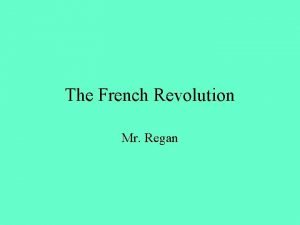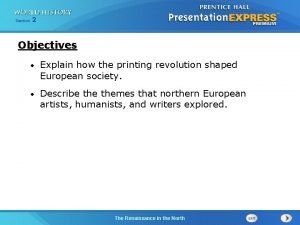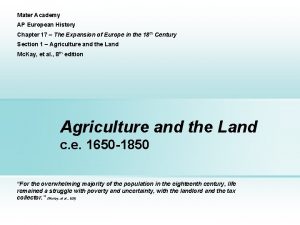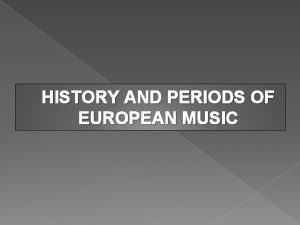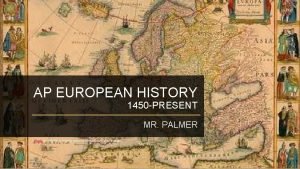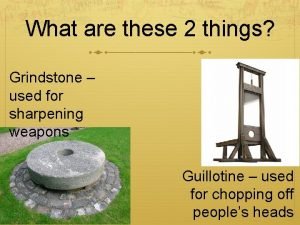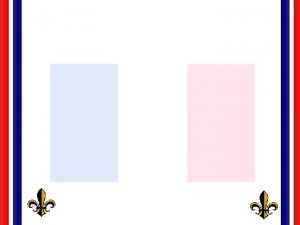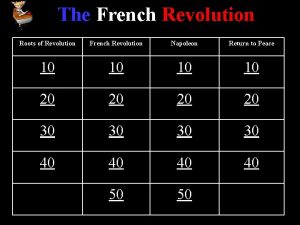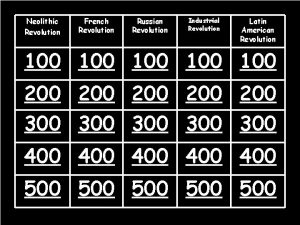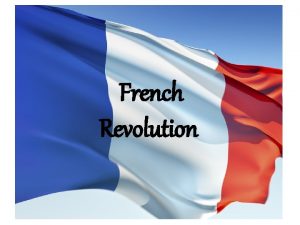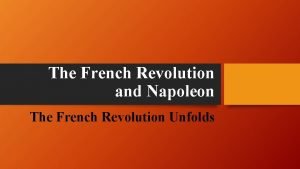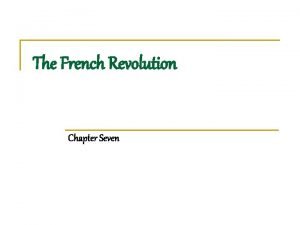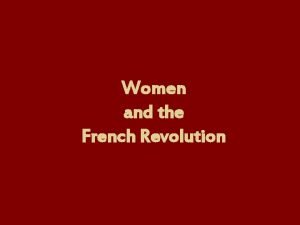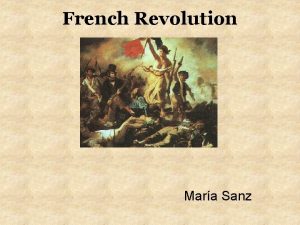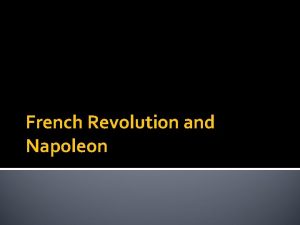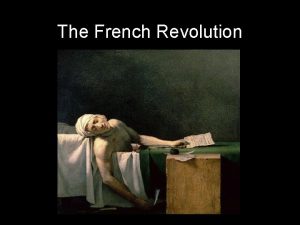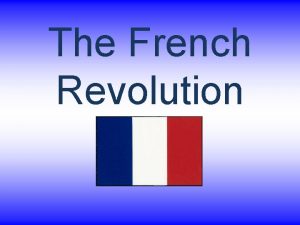The French Revolution AP European History French Revolution



























































- Slides: 59

The French Revolution AP European History

French Revolution Part I The Governing bodies: • National Assembly (1789 -1791) • Legislative Assembly (1791 -1792) • National Convention (1792 -1795) • Directory (1795 -1799)

The French Revolution: Problems Facing the French Monarchy Review – Line of succession • Louis XIV -Sun King • Louis XV – Madame de Pompadour*** – Loss of empire in the Seven Years’ War • Louis XVI – Marie Antoinette – Role in the American Revolution


Problems facing the French Monarchy A. Louis XIV was almost constantly at war which drained the treasury.






B. The Palace of Versailles was used to control the nobles who lived there by making them dependent upon the king.

But the lavish lifestyle of the Palace of Versailles left France deeper in debt.

D. National debt went from 400 million livres in 1643 to 2 billion when Louis XIV died in 1715.

D. Louis XVI and Marie Antoinette 1. France went deeper into debt supporting the colonists in the American Revolution

2. The Enlightenment ideas pushed for equality, rights, and government reforms

II. Problems Facing the French Economy A. Economic prosperity of mid-1700 s 1. Trade and industrial production was increasing 2. The problem was that the growing prosperity was not shared with the 3 rd estate

III. Problems Facing the French Economy B. No way to pay debt without ending the tax privileges of the nobility (2 nd estate)

C. Bad farm harvests of 1787 -1788 resulted in food shortages and rising food prices D. Manufacturing depression resulted in more unemployment E. 1/3 of population was impoverished

IV. Life Under the Ancien Regime A. The Monarchy promoted the Church, divine right and an absolutist state B. Static society based on tradition, hereditary and ritual C. Estates System based upon social position, rights, privileges, and obligations

Estates of France First Estate: Clergy a. Less than 1% of population but owned 10% of land b. 2% of income to gov’t d. Some services to poor e. Divided between the parish priests from the 3 rd estate vs. higher clergy from the 2 nd estate

Estates of France Second Estate: Nobility a. Less than 2% of population but owned 2530% of land b. Nobles divided between the nobility of the robe vs. sword d. exemptions from the taxes called the taille e. Blocked new royal taxes via parlements

Estates of France Third Estate: 97% of population 1) Bourgeoisie: middle class (8%) included: merchants, industrialists, bankers, lawyers, doctors, writers, holders of government offices

Third Estate: 97% of population 1) Bourgeoisie: middle class (8%) a. 20 -25% of the land b. Paid high taxes & lacked privileges of nobility c. Some upper middle class entered the nobility of the robe

2) Workers in cities: trades people, servants a. Decline in purchasing power, often hungry and unable to buy bread which costs 1/3 -1/2 of their income b. Frequently out of work

3) Peasants: 80% of the population a. Owned 35 -40% of the land b. Feudal obligations had them pay 50% of income to the nobles to use the community mills, presses, etc. c. 10% to the church

“What is the Third Estate? Everything. What has it been in the political order up to the present? Nothing. What does it ask? To be something. ” -Abbe Sieyes Priest 1789 in a Pamphlet What does this quote reveal about the views of the 3 rd Estate?



IV. Power of the parlements and the failure to make reforms A. 13 parlements (regional courts of law) had traditional power to block royal edicts B. parlements’ view of themselves as ‘protectors of liberty’ C. Nobles looking out for own self-interests and refusal to approve new taxes

Louis is looking at the chests and asks "where is the tax money? " The financial minister, Necker, says "the money was there last time I looked. " The nobles and clergy are sneaking out the door carrying sacks of money, saying "We have it. "

Resolved: In order to cure the financial ills of the kingdom of France, that the taille be increased upon the members of the Third Estate, especially among those members most able to pay.


Convening of the Estates General to solve the financial crisis on May 5, 1789 • List of grievances • Partner assignment

V. Convening of the Estates General to solve the financial crisis on May 5, 1789 for the first time since 1614 A. Third Estate allowed 600 delegates while the 1 st and 2 nd were allowed 300 each B. Some of the young, liberal, and urban members of the 1 st and 2 nd Estate supported the Third Estate C. Cahiers de doléances (grievances) promoted a constitutional gov’t and the abolishment of tax privileges of the church and nobility

D. Debate on how to count the votes 1. by order which was the traditional method pushed by the 1 st and 2 nd Estate 2. or by head which was pushed by the Society of Thirty and the 3 rd Estate

VI. The National Assembly: A. Abbe Sieyes promoted the interests of the Third Estate in the pamphlet: What is the Third Estate? B. First Estate’s declaration to vote by order C. Third Estate declared itself a National Assembly and decided to draw up a constitution on June 17, 1789

“Who then shall dare to say that the Third Estate has not within itself all that is necessary for the formation of a complete nation? It is the strong and robust man who has one arm still shackled. If the privileged order should be abolished, the nation would be nothing less, but something more. Therefore, what is the Third Estate? Everything; but an everything shackled and oppressed. What would it be without the privileged order? Everything, but an everything free and flourishing. Nothing can succeed without it, everything would be infinitely better without the others. ”

D. The Tennis Court Oath on June 20, 1789 after being locked out of the National Assembly

1. Third Estate had no legal right to form a new government 2. Louis XVI – sides with First Estate, prepared to dissolve and use force

Is there any proof that people played tennis before the French Revolution?

Is there any proof that people played tennis before the French Revolution? YES! Many people served in Louis XVI's Court!

Why is it unusual for tennis players to marry? Because love means nothing to them


E. Fall of the Bastille on July 14, 1789 1. King’s attempt to defend government buildings and dissolve the National Assembly inflames the public 2. Parisian citizens’ arm themselves and attack the Bastille 3. Royal authority collapses 4. Peasant revolutions in the countryside


What do you call a place you see in Paris? • a parasite

Eiffel Tower along the Seine River

If you jumped off a bridge in Paris, you’d be in Seine

F. The Great Fear 1. Agrarian peasant rebellions throughout France from July 19 th – August 3 rd 2. general resentment of feudal obligations, tithes, quitrents (tax) and dues while the nobility enjoyed privileges 3. The “Great Fear” of foreign troops invading with noble support 4. Popular uprisings influenced the National Assembly to make more reforms

Kings sometimes found that uprisings were a peasant surprise.

VII. Destruction of the Old Regime by the National Assembly A. On August 4 th, 1789 the privileges of nobility ended

B. Declaration of the Rights of Man (August 26, 1789) 1. Reflection of philosophes’ ideas and Declaration of Independence 2. Major provisions: natural rights, equality, representative government, freedom of speech

3. Olympe de Gouges and Declaration of the Rights of Woman and the Female Citizen is ignored by the National Assembly

1. King’s refusal to pass decrees of the National Assembly 2. Lack of bread in cities led the women to march 12 miles to Versailles

Women’s March to Versailles 4. King’s capitulation – “We are bringing back the baker, the baker’s wife, and the baker’s boy. ”

Why is the baker so mean? Because he beats the bread

National Assembly: D. Secularization of the Church 1. Confiscation of church property and issuance of assignats (paper $) 2. Civil Constitution of the Clergy in July 1790 a. Election of bishops and priests paid by state b. ½ the clergy made an Oath of allegiance to the Civil Constitution c. Blunder by the National Assembly since now the church was an enemy of the revolution

VIII. Rise of Jacobins A. Growing opposition to National Assembly because of the restrictions on the Church and inflation B. Growth of Jacobin clubs throughout France to promote radical reforms

The National Assembly: IX. King’s Flight from Paris in June 1791 A. widespread tax evasion increases debt B. National Assembly trusted the king and feared a republic C. King tried to flee from the revolutionary movement but was captured at Varennes
 European rulers denounced the french revolution because
European rulers denounced the french revolution because Russian revolution vs french revolution
Russian revolution vs french revolution How could the french revolution been avoided
How could the french revolution been avoided Explain how the printing revolution shaped european society
Explain how the printing revolution shaped european society Middle ages floral design
Middle ages floral design 1993 europa
1993 europa Modern floral design history
Modern floral design history Discuss the art of emerging europe.
Discuss the art of emerging europe. Dbq rubric ap world
Dbq rubric ap world Baroque floral design history
Baroque floral design history Ap european history chapter 17
Ap european history chapter 17 Music history periods
Music history periods European cuisine history
European cuisine history Early american period floral design
Early american period floral design Palmer european history
Palmer european history Third agricultural revolution definition
Third agricultural revolution definition Hát kết hợp bộ gõ cơ thể
Hát kết hợp bộ gõ cơ thể Slidetodoc
Slidetodoc Bổ thể
Bổ thể Tỉ lệ cơ thể trẻ em
Tỉ lệ cơ thể trẻ em Voi kéo gỗ như thế nào
Voi kéo gỗ như thế nào Thang điểm glasgow
Thang điểm glasgow Alleluia hat len nguoi oi
Alleluia hat len nguoi oi Các môn thể thao bắt đầu bằng tiếng chạy
Các môn thể thao bắt đầu bằng tiếng chạy Thế nào là hệ số cao nhất
Thế nào là hệ số cao nhất Các châu lục và đại dương trên thế giới
Các châu lục và đại dương trên thế giới Công thức tính thế năng
Công thức tính thế năng Trời xanh đây là của chúng ta thể thơ
Trời xanh đây là của chúng ta thể thơ Mật thư tọa độ 5x5
Mật thư tọa độ 5x5 Làm thế nào để 102-1=99
Làm thế nào để 102-1=99 độ dài liên kết
độ dài liên kết Các châu lục và đại dương trên thế giới
Các châu lục và đại dương trên thế giới Thể thơ truyền thống
Thể thơ truyền thống Quá trình desamine hóa có thể tạo ra
Quá trình desamine hóa có thể tạo ra Một số thể thơ truyền thống
Một số thể thơ truyền thống Cái miệng nó xinh thế
Cái miệng nó xinh thế Vẽ hình chiếu vuông góc của vật thể sau
Vẽ hình chiếu vuông góc của vật thể sau Nguyên nhân của sự mỏi cơ sinh 8
Nguyên nhân của sự mỏi cơ sinh 8 đặc điểm cơ thể của người tối cổ
đặc điểm cơ thể của người tối cổ Thế nào là giọng cùng tên? *
Thế nào là giọng cùng tên? * Vẽ hình chiếu đứng bằng cạnh của vật thể
Vẽ hình chiếu đứng bằng cạnh của vật thể Phối cảnh
Phối cảnh Thẻ vin
Thẻ vin đại từ thay thế
đại từ thay thế điện thế nghỉ
điện thế nghỉ Tư thế ngồi viết
Tư thế ngồi viết Diễn thế sinh thái là
Diễn thế sinh thái là Dot
Dot Các số nguyên tố là gì
Các số nguyên tố là gì Tư thế ngồi viết
Tư thế ngồi viết Lời thề hippocrates
Lời thề hippocrates Thiếu nhi thế giới liên hoan
Thiếu nhi thế giới liên hoan ưu thế lai là gì
ưu thế lai là gì Khi nào hổ con có thể sống độc lập
Khi nào hổ con có thể sống độc lập Sự nuôi và dạy con của hổ
Sự nuôi và dạy con của hổ Hệ hô hấp
Hệ hô hấp Từ ngữ thể hiện lòng nhân hậu
Từ ngữ thể hiện lòng nhân hậu Thế nào là mạng điện lắp đặt kiểu nổi
Thế nào là mạng điện lắp đặt kiểu nổi Grindstone french revolution
Grindstone french revolution Causes and effects of french revolution
Causes and effects of french revolution
